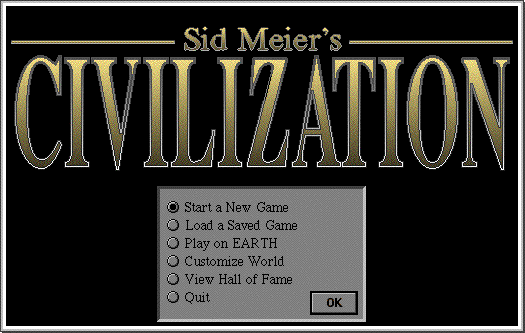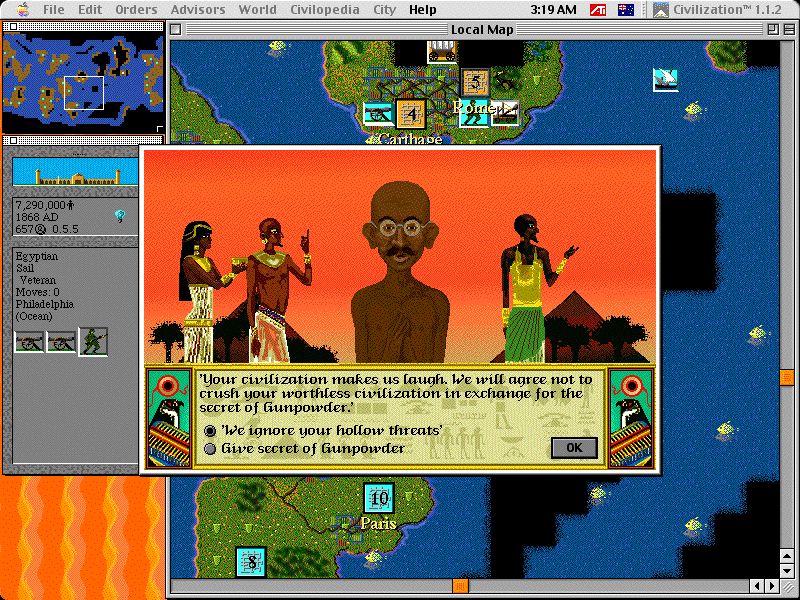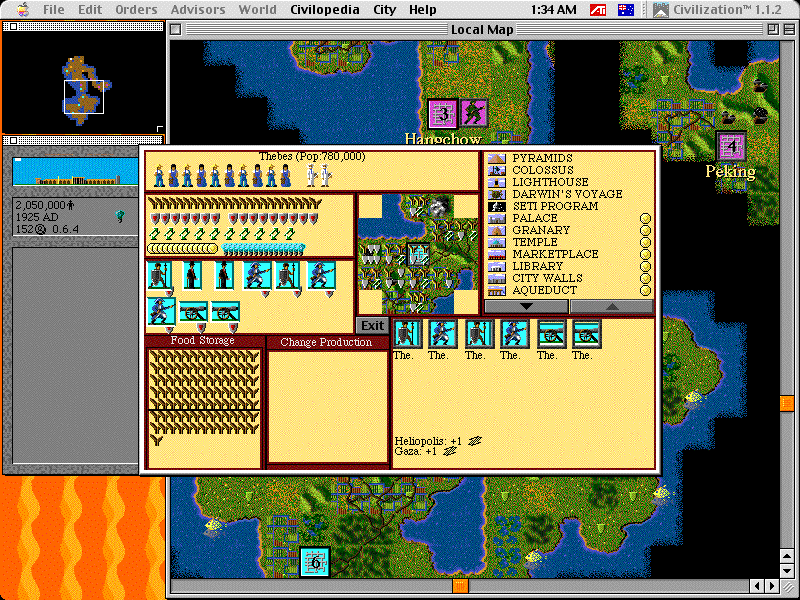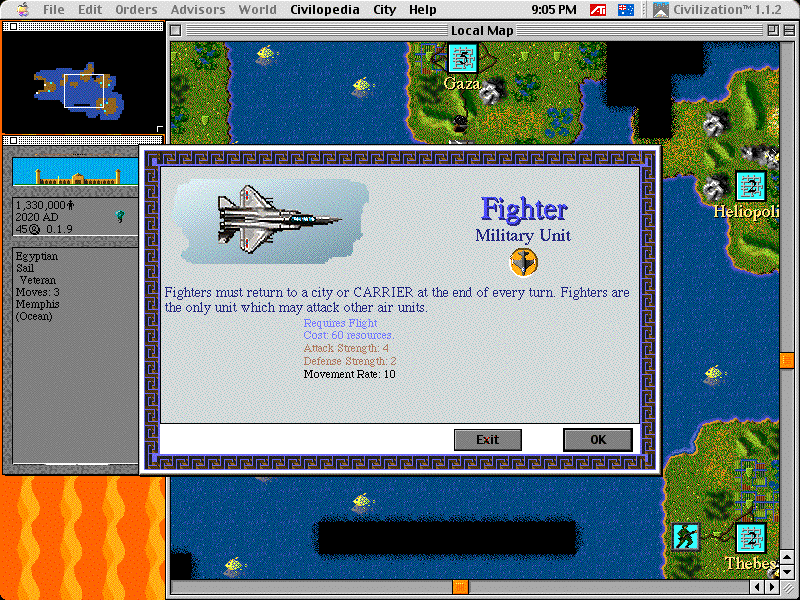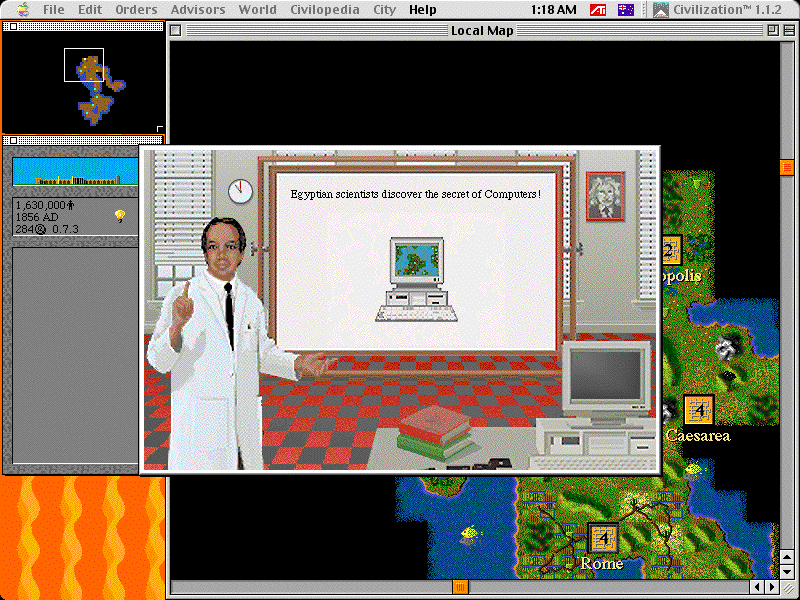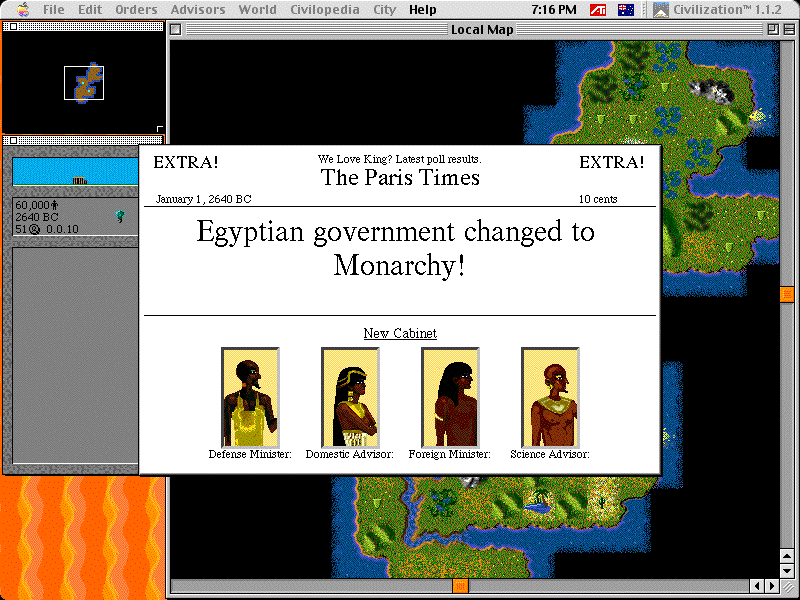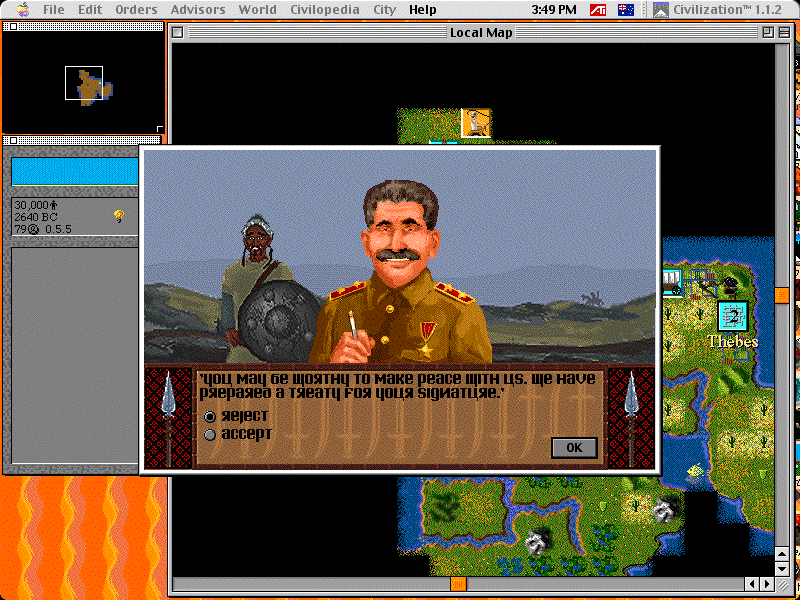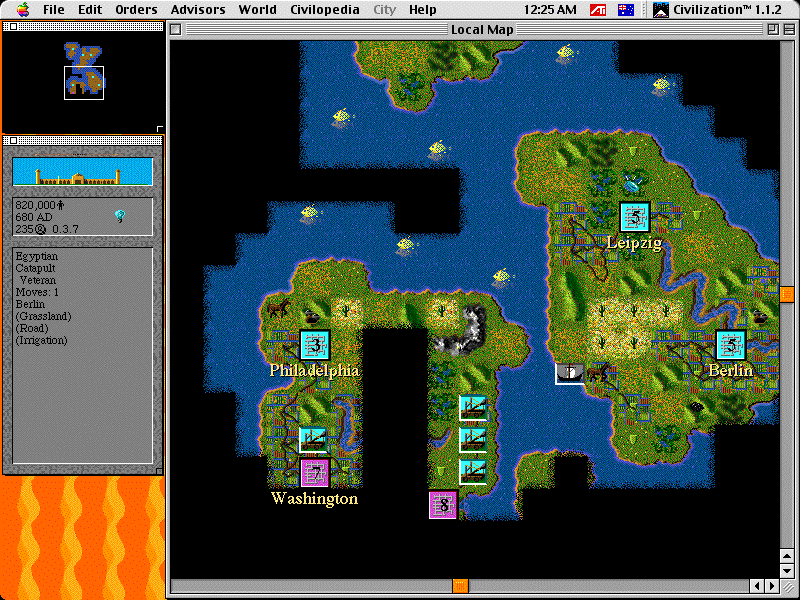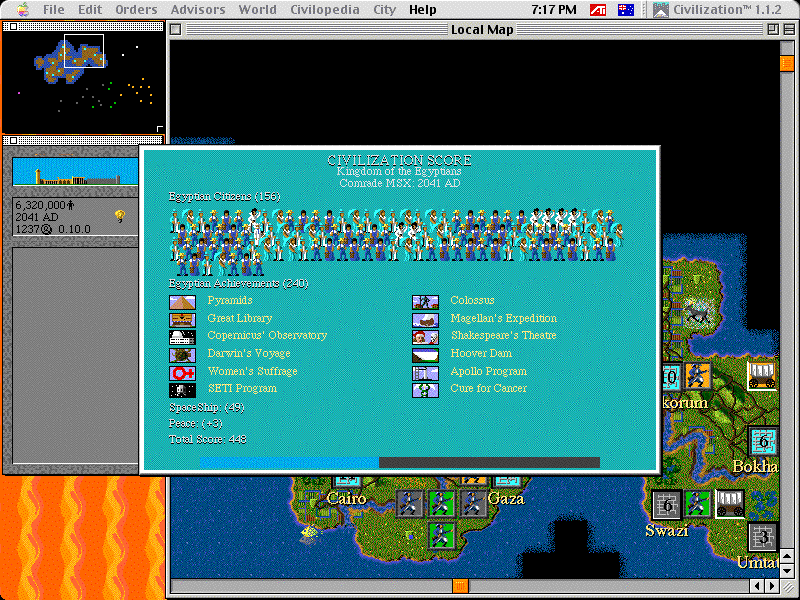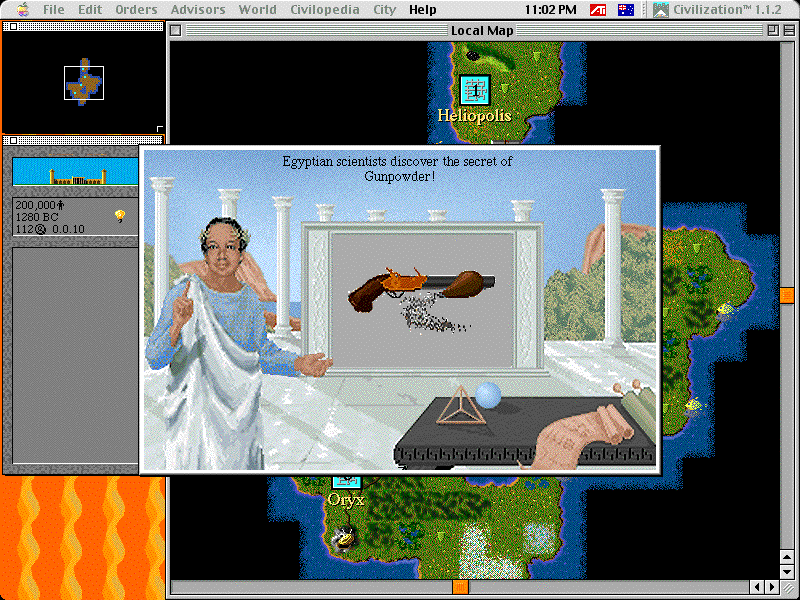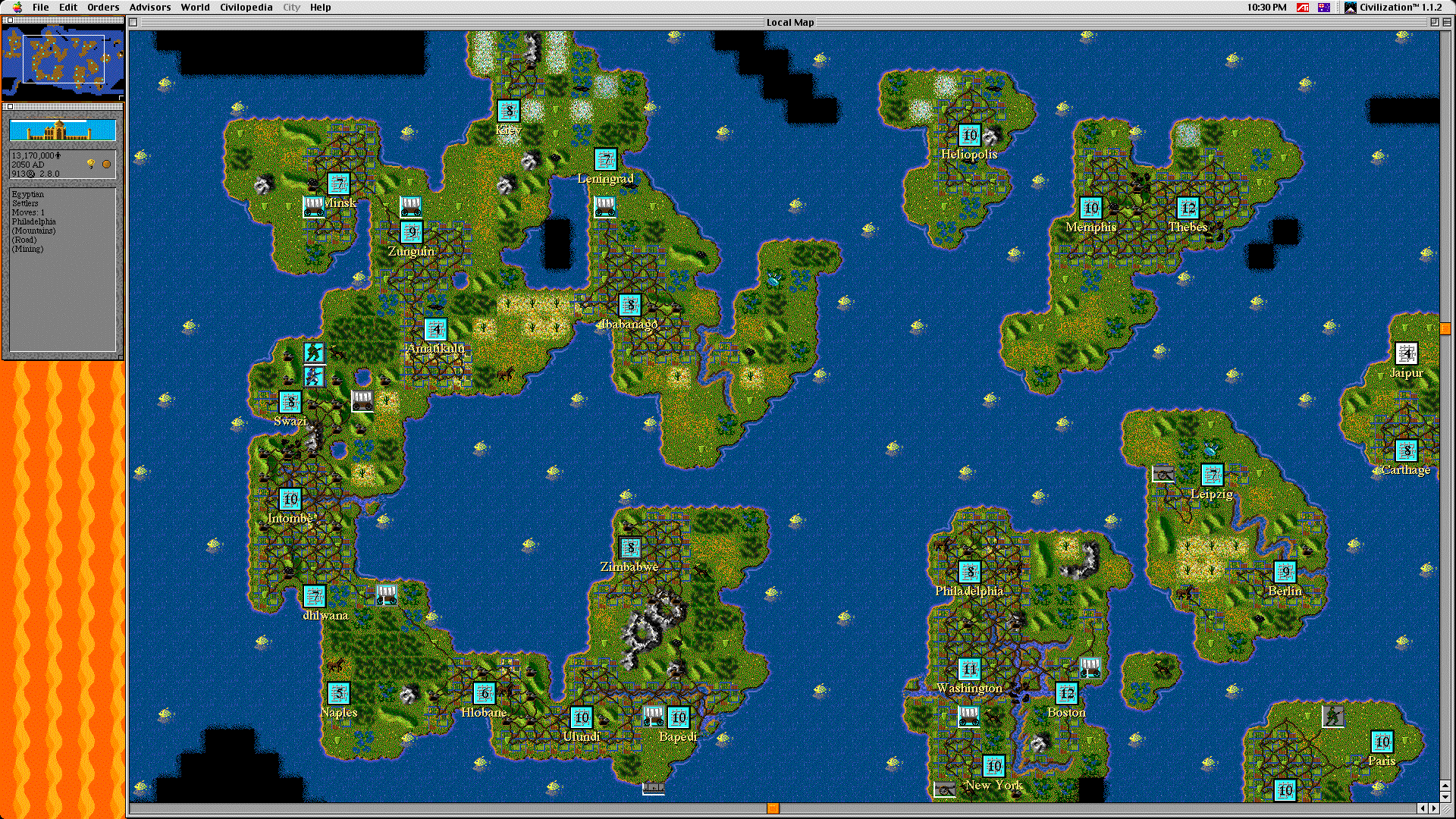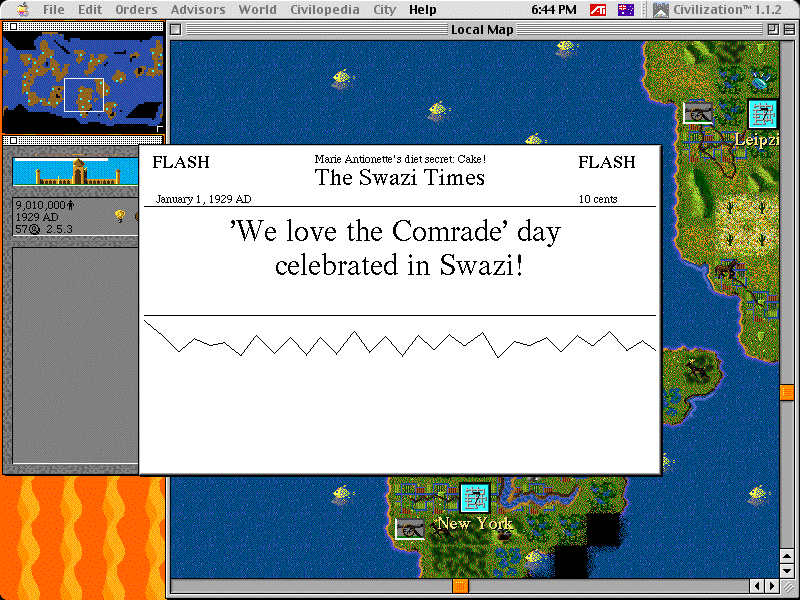Civilization – MicroProse - 1993 - First time playing?: Yes!
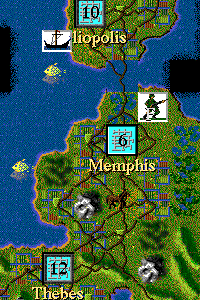 I'm sure you've all heard the phrase before; just one more turn. Civilization is the productivity killer, the destroyer of sleep schedules. How foolish I was to think “well I've got some other Macintosh games arriving via snail mail in a week or so, so I guess I could play a little Civilization in the meanwhile”. Eventually I had to accept that in order to justify the time I spent playing it on my PowerMac opposed to other stuff I was intending to review, I'd have to review Civilization.
I'm sure you've all heard the phrase before; just one more turn. Civilization is the productivity killer, the destroyer of sleep schedules. How foolish I was to think “well I've got some other Macintosh games arriving via snail mail in a week or so, so I guess I could play a little Civilization in the meanwhile”. Eventually I had to accept that in order to justify the time I spent playing it on my PowerMac opposed to other stuff I was intending to review, I'd have to review Civilization.
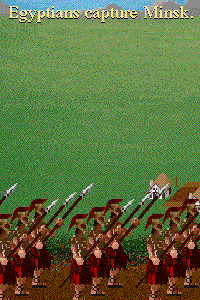 Am I complaining? No, because I got to play Civilization. It's a classic for a reason, a 4X strategy game on an epic multi-millennia spanning scale that I can imagine was quite unlike anything else out there at the time. The Mac version is also an absolutely superb port, being almost more akin to a remaster. It's also very very bloodthirsty. My prior Civilization experience is limited to playing a bit of Civilization IV, where peaceful diplomatic relations are much more viable and fleshed out. Civilization I isn't quite like that.
Am I complaining? No, because I got to play Civilization. It's a classic for a reason, a 4X strategy game on an epic multi-millennia spanning scale that I can imagine was quite unlike anything else out there at the time. The Mac version is also an absolutely superb port, being almost more akin to a remaster. It's also very very bloodthirsty. My prior Civilization experience is limited to playing a bit of Civilization IV, where peaceful diplomatic relations are much more viable and fleshed out. Civilization I isn't quite like that.
In this game you play as the Imperium of Man’s corpse emperor. This is my best explanation as to why you don't even consider retiring until you've been running your fascistic hellscape civilisation for 6060 years straight, and I am sorry to all of the non-Warhammer 40k fans I just alienated with that comparison. You are in competition with the other immortal fascist dictator demigods such as Genghis Khan, Julius Caesar, Queen Elizabeth I, and uh, Gandhi. You see, Earth was doing pretty well for itself as the intro to the game depicts, developing diverse life and ecosystems, and now that humanity has gained sapience, you must demolish and pollute all of the beauty of this world with factories and wars and nukes and industrialism, until the planet is such a wreck that the only way forward is to escape to space and unleash mankind upon another undeserving planet. After all, if you are the first to get to space, then you know your name will be immortalized as the ultimate God Emperor of humanity. Is this an overly cynical grimdark viewing of the game? Yes. Hey, did you know that living dolls made out of recycled wood are ecologically sustainable and require minimal sustenance other than magic to function, thus cutting back on consumption of limited resources? Sacrifice your souls to wooden hosts today, or else you'll be doomed to the natural end-point of humanity; nuclear warfare with zombie Mahatma Gandhi.
(As an aside, this is fairly widespread knowledge now, but in case you weren't filled in, the myths about an overflow bug causing Gandhi to be prone to nuclear warfare in Civilization I is just that, a myth and urban legend later debunked by the developers. Gandhi however is that nuke-happy in Civilization V by design, so Nuclear Gandhi is real in at least one Civ game.)
In a less cynical view, Civilization is essentially an alternate history sandbox exploring the development of mankind across the span of 6080 years, starting at 4000BC in the stone age and concluding in the near future of 2080AD. Starting with nothing but a roaming caravan, you'll develop your caveman society into a high tech worldwide border-spanning megalopolis in your endless pursuit of ultimate domination over all of mankind. Oops, there's the cynicism again. Anyone who has only played the later entries in the Civilization series are likely baffled, as those later games are, by contrast to this, a celebration of human history and cultural diversity with more diplomatic options at your disposal to make pacifist playstyles more viable, with warmongering being just one method of victory. Civilization I by comparison only has two win conditions; kill every other civilisation or go to space. The AI is also bloodthirsty and obsessed with senseless war, and even if you try to meet them halfway and accept all of their demands, they still may backstab you the very next turn unprovoked. This doesn't necessarily make Civilization I bad by comparison, as much as it just makes it somewhat more… simple? Conventional? Smaller scale? None of these words feel suitable to describe Civilization as the game is still very deep and complex.
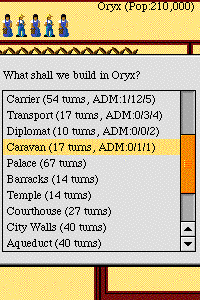 Civilization isn't just a wargame. It's also got a lot of SimCity in its DNA as well, with managing your civilisation and its civilians being a huge focus. Building up your empire relies on three primary resources; food, production and trade. Food is represented by a wheat icon and required to keep your population alive. If your city doesn't have enough food, your population will drop, but if you have an excess of food then your population will increase. Production refers to resources used to create city improvements, world wonders and military units. It's somewhat misleadingly represented by a shield icon, but the more shields your city has, the faster it can manufacture things. Production is also used for upkeep of certain military units as well. Trade meanwhile is represented by circling green arrows, and what it does is dependent on your tax rate. Your trade resources can be split between your own income, funding for scientific research and luxuries for keeping the populace happy. As for how you get these resources, you do so by setting up farms, mines and fishing spots which your citizens can work at in order to generate all three resources. Certain tiles on the map also contain special resources such as gold, gems, oil, fish, animals and so on, all of which will greatly increase the resources given by that tile, and are as such well worth building your city next to in order to exploit.
Civilization isn't just a wargame. It's also got a lot of SimCity in its DNA as well, with managing your civilisation and its civilians being a huge focus. Building up your empire relies on three primary resources; food, production and trade. Food is represented by a wheat icon and required to keep your population alive. If your city doesn't have enough food, your population will drop, but if you have an excess of food then your population will increase. Production refers to resources used to create city improvements, world wonders and military units. It's somewhat misleadingly represented by a shield icon, but the more shields your city has, the faster it can manufacture things. Production is also used for upkeep of certain military units as well. Trade meanwhile is represented by circling green arrows, and what it does is dependent on your tax rate. Your trade resources can be split between your own income, funding for scientific research and luxuries for keeping the populace happy. As for how you get these resources, you do so by setting up farms, mines and fishing spots which your citizens can work at in order to generate all three resources. Certain tiles on the map also contain special resources such as gold, gems, oil, fish, animals and so on, all of which will greatly increase the resources given by that tile, and are as such well worth building your city next to in order to exploit.
Upset citizens can cause civil unrest and prevent production, so ensuring they are content with your ironfisted rule by providing luxuries, temples and colosseums to distract them from the fact that they are pawns to an uncaring monarchy is essential. The less content civilians you have, the less workers you have to get your resources from. In addition to working the fields, civilians can also be assigned work as entertainers, scientists or economists. Entertainers keep the populace happy, scientists generate research and economists generate money. This can help generate extra research and money outside of the previously established trade resources. It’s unfortunately tricky to figure out exactly what’s causing dissatisfaction among your citizens, as nothing on the city page really explains what they’re rioting over. If you know what tends to set them off then you can generally figure out what their problem is, but it still could be conveyed better.
As for what you’re producing with that production resource and the hard work of content civilians, military units are of course for warfare and fairly straightforward. City improvements are facilities you build within your cities that give a variety of passive effects, such as increasing science research or income, keeping your populace happy, strengthening city walls for defence, strengthening up military units and accelerating population growth, among many other things. These facilities have an upkeep cost, taking a small cut of your financial income each turn in order to keep them maintained and functional, so while the benefits are essential to success, you want to make sure you don’t build more than you can maintain. World wonders meanwhile have no upkeep cost and have even more powerful passive effects, but with a few setbacks. Only one of each world wonder can be built in any single game, so if another player beats you to building that world wonder, the only way you can get it now is by stealing it from them by capturing their cities. In addition, the effects of some world wonders can be nullified by future scientific discoveries. They’re well worth the effort due to their powerful effects regardless, even if they take a lot of production to build.
 Scientific research is more or less the main driving force in progress. It's how you get access to new city improvements, military units, world wonders and work your way up through the epochs. Once you've established your first city, you'll be asked by your science advisor to choose what you want to research. How long these science subjects take to research depends on how much trade and scientists you have assigned to research. The more scientists on the job, the quicker you'll find new technology to outpace your opponents with. Researched technology unlocks everything mentioned above, giving you access to brand new facilities and weapons to help you expand your civilisation with, in addition to unlocking new and even more advanced subjects for you to research. To give an example of how this works, researching bronze working grants you access to the Phalanx defensive units, in addition to also allowing research of currency, which allows you to build marketplaces in your city to generate more income, as well as iron working, which gives you access to the Legion units. Researching currency then allows you to research trade, as long as you first research code of laws. It's tricky to wrap your head around at first as the game does an honestly pretty poor job of explaining what unlocks what without digging through the in-game glossary, but once you have a better idea of what unlocks what, you have a ton of freedom in what technology you choose to prioritise researching first, depending on what is most useful to your preferred play style.
Scientific research is more or less the main driving force in progress. It's how you get access to new city improvements, military units, world wonders and work your way up through the epochs. Once you've established your first city, you'll be asked by your science advisor to choose what you want to research. How long these science subjects take to research depends on how much trade and scientists you have assigned to research. The more scientists on the job, the quicker you'll find new technology to outpace your opponents with. Researched technology unlocks everything mentioned above, giving you access to brand new facilities and weapons to help you expand your civilisation with, in addition to unlocking new and even more advanced subjects for you to research. To give an example of how this works, researching bronze working grants you access to the Phalanx defensive units, in addition to also allowing research of currency, which allows you to build marketplaces in your city to generate more income, as well as iron working, which gives you access to the Legion units. Researching currency then allows you to research trade, as long as you first research code of laws. It's tricky to wrap your head around at first as the game does an honestly pretty poor job of explaining what unlocks what without digging through the in-game glossary, but once you have a better idea of what unlocks what, you have a ton of freedom in what technology you choose to prioritise researching first, depending on what is most useful to your preferred play style.
Such research also grants you access to alternative government systems. You start the game with a despot government, but once you’ve researched alternatives you can switch your government type to a monarchy, communism, democracy and more. Each government has advantages and disadvantages that you have to work around which radically change the playstyle of the game. For instance, democracy may be powerful if you’ve got the right build for it due to it lacking corruption, but happiness is much harder to manage under democratic rule due to civilians becoming upset if there are military units near their cities. Communism ended up being my favourite for the majority of the game. The honestly pretty funny effect of communism is that corruption is pretty low, but the level of corruption is spread completely equally across every city in the entire game. It is our corruption, comrade.
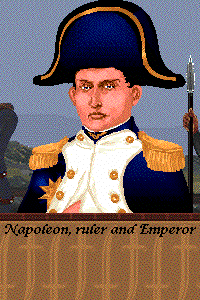 Once you encounter other civilisations, you'll be introduced to their leader, a historical figure relevant to the nation in question, who you can communicate with to either reach a peace treaty or declare war. Diplomacy is very limited in Civilization I. Every leader has the same AI in negotiations, and dialogue and negotiations always go the same way with them. They open up, immediately call your civilisation primitive and offer to trade techs. After this, whether you agree or not, they'll start even more directly insulting your ‘puny’ civilisation and say that they'll only consider not wiping it off the face of the earth if you pay tribute. Then finally, after that threat, they'll either offer a peace treaty or immediately declare war. Yes, even Gandhi is this immediately hostile to you in every interaction you have with him. The different leaders do have different playstyles with some being more warmongering than others, but it’s not conveyed well by everyone speaking the exact same limited and hostile dialogue. In the end, the negotiations really don't amount to much. You get very little out of agreeing to their demands as even civilisations that you always bend over backwards for are prone to attacking you unprovoked, and even when you're at peace with other nations, they still play in an obnoxiously passive-aggressive way by setting up garrisons next to your cities and intentionally blocking your units from moving freely across the map, only moving if you pay them a small fortune with a diplomat. It's like they're always baiting you into getting fed up with them and declaring war, until eventually I just start refusing to even negotiate with them at all and just open fire on sight.
Once you encounter other civilisations, you'll be introduced to their leader, a historical figure relevant to the nation in question, who you can communicate with to either reach a peace treaty or declare war. Diplomacy is very limited in Civilization I. Every leader has the same AI in negotiations, and dialogue and negotiations always go the same way with them. They open up, immediately call your civilisation primitive and offer to trade techs. After this, whether you agree or not, they'll start even more directly insulting your ‘puny’ civilisation and say that they'll only consider not wiping it off the face of the earth if you pay tribute. Then finally, after that threat, they'll either offer a peace treaty or immediately declare war. Yes, even Gandhi is this immediately hostile to you in every interaction you have with him. The different leaders do have different playstyles with some being more warmongering than others, but it’s not conveyed well by everyone speaking the exact same limited and hostile dialogue. In the end, the negotiations really don't amount to much. You get very little out of agreeing to their demands as even civilisations that you always bend over backwards for are prone to attacking you unprovoked, and even when you're at peace with other nations, they still play in an obnoxiously passive-aggressive way by setting up garrisons next to your cities and intentionally blocking your units from moving freely across the map, only moving if you pay them a small fortune with a diplomat. It's like they're always baiting you into getting fed up with them and declaring war, until eventually I just start refusing to even negotiate with them at all and just open fire on sight.
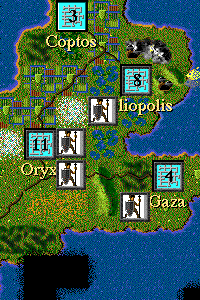 Unlike the rest of the game, combat is actually very simple. Simply move one of your units into an enemy unit to attack them. If RNG favours you, then your unit lives and the one you attack dies. If you’re unlucky, then your unit dies in a counterattack while the one you’re attacking remains unscathed. Each unit has three stats; attack, defence and movement. The higher the attack, the more likely the unit will deal a killing blow. The higher the defence, the more likely that unit will counter an enemy attack. Defensive units are best used for guarding your cities, while offensive units are for attacking your enemies directly and taking over their cities. Movement meanwhile is simply how many tiles the unit can move across before their turn ends.
Unlike the rest of the game, combat is actually very simple. Simply move one of your units into an enemy unit to attack them. If RNG favours you, then your unit lives and the one you attack dies. If you’re unlucky, then your unit dies in a counterattack while the one you’re attacking remains unscathed. Each unit has three stats; attack, defence and movement. The higher the attack, the more likely the unit will deal a killing blow. The higher the defence, the more likely that unit will counter an enemy attack. Defensive units are best used for guarding your cities, while offensive units are for attacking your enemies directly and taking over their cities. Movement meanwhile is simply how many tiles the unit can move across before their turn ends.
Honestly, warfare kind of sucks in Civilization. Regardless of unit stats, attacking always involves a lot of RNG and can very easily result in absurd stalemates that last the entire game without either side budging from their devotion to genocidal conquest. Early on it's viable to quickly wipe out other civilisations, sure, while they're small and unarmed, but the second you've got musketeers and city walls involved? Yeah, not even the Mongolians are breaking down those city walls. It's honestly absurd just how overpowered city walls are. I've managed to get a space race win just by building city walls everywhere and then letting every opposing army completely surround me and futilely try to attack my cities with stacks of their most powerful units, and they still failed to damage me turn after turn while I could just focus on building my spaceship uninterrupted. You can attack a city with bombers and tanks, but as long as a wall is up and someone in those fortifications has a barely functional musket from the civil war, you're still going to be struggling to even scratch them. The pacing also slows to a crawl once you've got a massive army to take on the world with. This goes for any 4X game, but generally it's mitigated by giving you the ability to combine units into parties and have them all move as one in a group. As far as I can tell, there's no such function in Civilization I aside from manufacturing carrier vehicles, which are great for quickly getting groups of units across a long distance fast, but also cost resources, take a few turns to produce and leave your units extremely vulnerable. In warfare they’re not viable, requiring you to move every single active unit individually one by one before the turn ends. You can potentially end up with over 100 units near the end of the game, so it’s needless to say a problem.
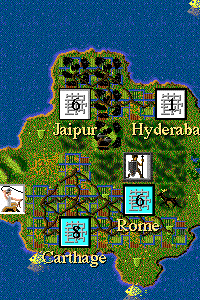 Well, there are still ways around that defence. Diplomats can pull some cloak and dagger spy shenanigans for instance, destroying cities from the inside or stealing technology from them. Or, if you're really far along in your scientific research, you can always go the overkill route. Yep, I'm talking about the Manhattan Project. Nuclear missiles will half a city's population and kill all units surrounding the targeted city. This however is one of the few war crimes you can perform in this game that actually has pretty severe consequences. Nuclear fallout will pollute the earth, reducing your civilisation score and souring your reputation. Oh yeah, it also kills a lot of innocent people, but that part is glossed over.
Well, there are still ways around that defence. Diplomats can pull some cloak and dagger spy shenanigans for instance, destroying cities from the inside or stealing technology from them. Or, if you're really far along in your scientific research, you can always go the overkill route. Yep, I'm talking about the Manhattan Project. Nuclear missiles will half a city's population and kill all units surrounding the targeted city. This however is one of the few war crimes you can perform in this game that actually has pretty severe consequences. Nuclear fallout will pollute the earth, reducing your civilisation score and souring your reputation. Oh yeah, it also kills a lot of innocent people, but that part is glossed over.
The civilisation score is yet another element that makes the game extremely replayable. This number increases or decreases depending on factors such as population count, civilian happiness, world wonders built, pollution management and more. Once the game is complete, your score is put onto a high score table and is ranked alongside historical world leaders in terms of success. The first time I finished a game I was ranked as being on the same level as Emperor Nero. In case you were wondering, that means that I sucked. (Disclaimer: I am aware that how good or bad a leader Nero was has actually been contested in recent years.) Either way, for those into the SimCity angle of Civilization, maxing your score out is a fun extra objective after you've achieved the space race and conquest endings that keeps the game engaging for even longer. Civilization I may not be as massive and feature packed as its sequels, but what's there still has plenty of longevity.
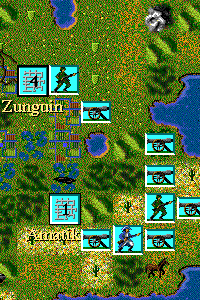 And now, a confession. Civilization has five difficulty levels, and for the majority of the week I spent playing this game, I was playing on Warlord difficulty, which is the second easiest difficulty in the game. I figured I would struggle with Civilization I, as old strategy games of this era tend to be pretty obtuse and use clunky interfaces that take some getting used to, so while I didn't want the game to be a total cakewalk as I figured the easiest difficulty would be, I figured one level below normal would be appropriate while I'm learning. I was correct in this assumption in the sense that the game did take me quite a bit of trial and error learning to get to grips with the UI and some of the game’s more poorly explained mechanics, however in retrospect I do honestly think I should have gone for a higher difficulty because the AI on Warlord is trash. In my experience they seem to be incapable of researching guns, resulting in their technology being stuck in the medieval dark ages unless they happen to steal more advanced tech from you or trade you for it. Once I realised that and simply prevented the AI from having any opportunities to steal tech from me, conquest victories on Warlord difficulty became a cakewalk, to the extent that I was able to achieve it before even hitting the year 2000AD. As a result of me playing on an easier difficulty, in addition to the depth and variety of playstyles Civ offers, I don’t doubt that I likely missed some mechanics or strategies that people more intimately familiar with the game swear by.
And now, a confession. Civilization has five difficulty levels, and for the majority of the week I spent playing this game, I was playing on Warlord difficulty, which is the second easiest difficulty in the game. I figured I would struggle with Civilization I, as old strategy games of this era tend to be pretty obtuse and use clunky interfaces that take some getting used to, so while I didn't want the game to be a total cakewalk as I figured the easiest difficulty would be, I figured one level below normal would be appropriate while I'm learning. I was correct in this assumption in the sense that the game did take me quite a bit of trial and error learning to get to grips with the UI and some of the game’s more poorly explained mechanics, however in retrospect I do honestly think I should have gone for a higher difficulty because the AI on Warlord is trash. In my experience they seem to be incapable of researching guns, resulting in their technology being stuck in the medieval dark ages unless they happen to steal more advanced tech from you or trade you for it. Once I realised that and simply prevented the AI from having any opportunities to steal tech from me, conquest victories on Warlord difficulty became a cakewalk, to the extent that I was able to achieve it before even hitting the year 2000AD. As a result of me playing on an easier difficulty, in addition to the depth and variety of playstyles Civ offers, I don’t doubt that I likely missed some mechanics or strategies that people more intimately familiar with the game swear by.
Impressively however, the game still was not boring in spite of the easy combat difficulty. Civilization is very much a game about discovery and experimentation for the first few playthroughs, and it took me a couple of practice runs before I was able to actually get the space race ending. The game ending on the spot if you reach 2080AD means that you'll need to figure out how to not waste your finite turns and get the most done in the least amount of time possible. You might think that the discovery element of the game is nullified if you actually read the manual and learn what everything does in advance, but simply being told what every upgrade, unit and resource does is not enough to build a cohesive strategy off of until you've played with those mechanics in-game and see how they compliment each other and figure out how they can be combined for the most optimal play. I initially wanted to compare Civilization’s mechanics to pieces of a jigsaw puzzle, until I realized that jigsaws don't let you turn the entire puzzle inside out and somehow still have all the pieces fit together snugly. Civilization’s pieces can click together in countless creative ways dependent on the player’s preferences, past actions and the variables introduced via the opposing CPU civilisations and randomly generated maps.
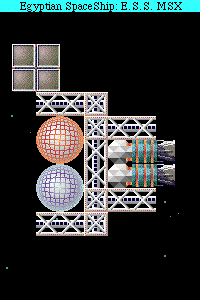 If this all sounds intimidating, well, I'm not going to lie to you and claim that Civilization is actually very simple and easy to pick up and play. It is a commitment. There's in-game tutorials as well as an in-game glossary that you can reference while playing, but those still aren't enough to explain all of Civ’s mechanics, with several aspects of the game such as “what do those resource icons even mean” requiring either paging through the massive 120 page instruction book or keeping a wiki up to cross reference as you play. However, I didn't find the learning curve frustrating and in fact even enjoyed it. As I mentioned earlier, the game is something of an alternate history sandbox that's fun in itself to play around with and create off-the-wall scenarios with. What if the Egyptians had invented guns by 1280BC? That's something you can achieve surprisingly easily once you know how. Any time you start a new game of Civilization it's yet another chance to rewrite your own distorted version of human history, taking everything you learnt from your last runs and using it to build up your empire faster, try new play styles and experiment more with the mechanics you've become such more to grips with. Defeat or starting over in Civilization doesn't feel like losing progress, as much as it's part of the process of making progress that opens up new possibilities of playstyles every time you start a new game. Learning to play Civilization is very much part of the fun, as opposed to a barrier of entry.
If this all sounds intimidating, well, I'm not going to lie to you and claim that Civilization is actually very simple and easy to pick up and play. It is a commitment. There's in-game tutorials as well as an in-game glossary that you can reference while playing, but those still aren't enough to explain all of Civ’s mechanics, with several aspects of the game such as “what do those resource icons even mean” requiring either paging through the massive 120 page instruction book or keeping a wiki up to cross reference as you play. However, I didn't find the learning curve frustrating and in fact even enjoyed it. As I mentioned earlier, the game is something of an alternate history sandbox that's fun in itself to play around with and create off-the-wall scenarios with. What if the Egyptians had invented guns by 1280BC? That's something you can achieve surprisingly easily once you know how. Any time you start a new game of Civilization it's yet another chance to rewrite your own distorted version of human history, taking everything you learnt from your last runs and using it to build up your empire faster, try new play styles and experiment more with the mechanics you've become such more to grips with. Defeat or starting over in Civilization doesn't feel like losing progress, as much as it's part of the process of making progress that opens up new possibilities of playstyles every time you start a new game. Learning to play Civilization is very much part of the fun, as opposed to a barrier of entry.
As for the Mac port? Absolutely superb across the board. It does require a patch to run on PowerPC processors like what my PowerMac uses, but this is a small barrier of entry to such an excellent version of the game. The UI is redesigned to be less cluttered and incorporate the Macintosh UI, with the game being split across multiple resizable windows with drop-down menus to access commands and options from. The sprites have been redrawn at a higher resolution with much more colour and detail as well, which again makes the game more readable than the DOS original. On top of that, the maximum resolution that Civilization can display at is entirely uncapped in the Macintosh port. Want to display Civilization in 1080p, nearly enough space to display the entire game world at once? Mac Civ can do it. If these features sound familiar to you, that’s because the later Windows port of Civilization I has more or less the same aesthetic and features. The only thing I don't care for here is that the scenes with other world leaders and your advisors still use the original DOS graphics, but upscaled with an ugly blurry filter that looks frankly pretty terrible. Oh, I also built a road on water by accident at one point, but for all I know that glitch could be in the DOS version as well.
All in all, while some aspects of the UI and controls may be a bit on the obtuse side and showing their age, Civilization I still has a rock solid core and satisfyingly addictive gameplay loop that holds up to this day, with open ended progression across randomly generated landscapes allowing for a ton of replay value. I basically had to pry myself away from Civilization to ensure I actually played some other games for future reviews, and even now there's a part of me that wants to play it more and tackle the higher difficulty levels. In conclusion? I want more and need to buy myself the Mac version of Civilization II ASAP.
- Page written by MSX_POCKY, 11th July 2025
